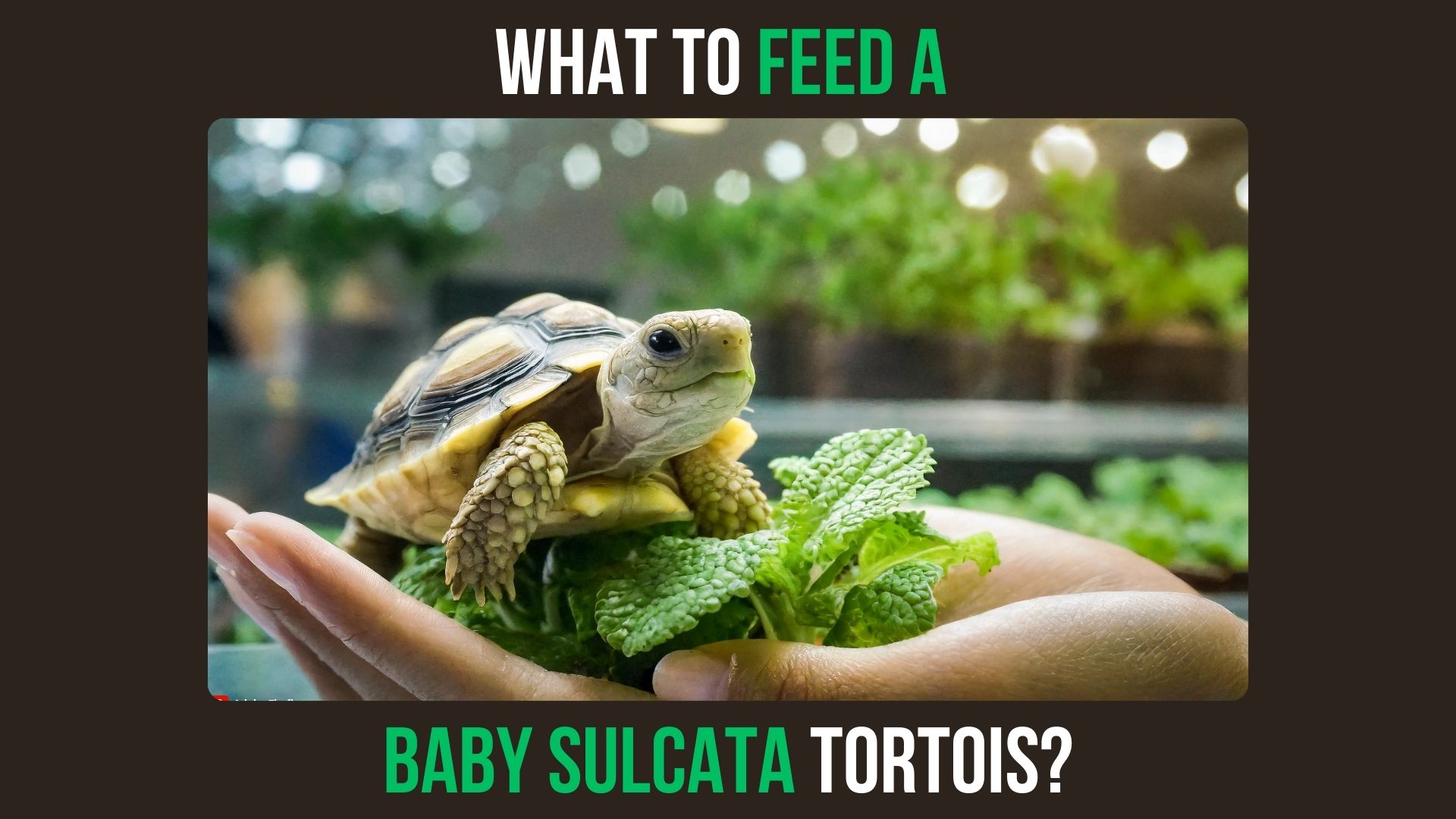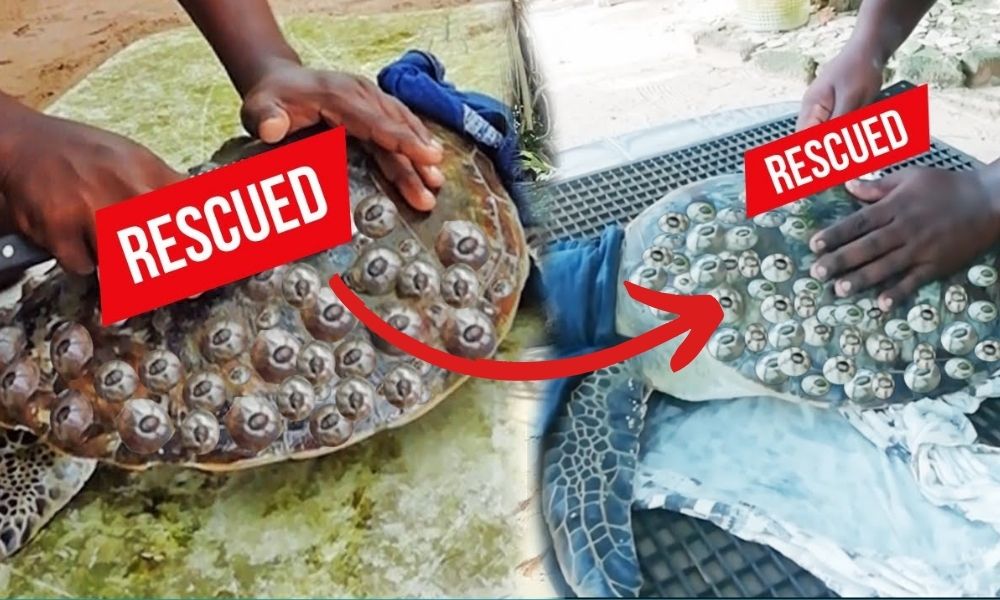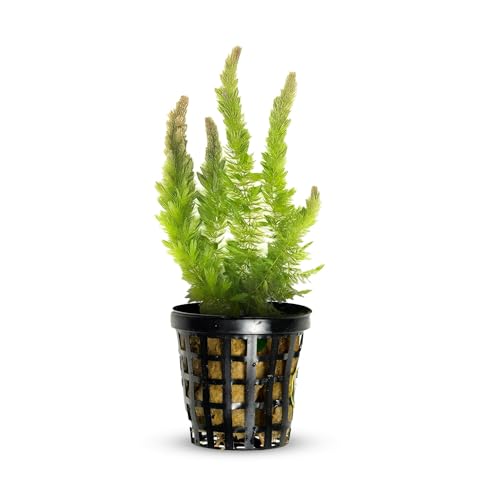To properly nourish a baby Sulcata tortoise, feed it a diet that includes a variety of leafy greens and vegetables, such as collard greens, kale, and dandelion greens. Additionally, offer occasional treats of fruits, such as strawberries and melons, as well as calcium supplements to ensure proper shell development.
Introducing solid food into a baby Sulcata tortoise’s diet plays a crucial role in its growth and development. As a responsible pet owner, it is vital to offer a balanced and nutritious diet that meets the specific dietary requirements of these fascinating creatures.
Proper nutrition is especially important during the early stages of a Sulcata tortoise’s life, as it helps establish a strong foundation for its overall health and well-being. We will discuss the essential foods that baby Sulcata tortoises should consume to thrive and grow into healthy adults.

The Right Diet For Baby Sulcata Tortoise
Baby Sulcata tortoises should be fed a diet rich in leafy greens such as kale, collard greens, and mustard greens, along with a small amount of grasses and hays. It’s crucial to provide a calcium supplement and ensure proper hydration by offering fresh water and occasional fruit treats like watermelon and cactus pads.
Variety and balance are key to their nutrition.
Key Nutritional Needs
Baby sulcata tortoises have specific nutritional requirements to support their growth and development. Providing the right diet is crucial to ensure their overall health and longevity.
Here are the key nutritional needs of baby sulcata tortoises:
- High in fiber: Sulcata tortoises need a diet rich in fiber to aid digestion and prevent constipation. Leafy greens and grasses are excellent sources of fiber.
- Low in protein: While protein is important for growth, excessive protein can lead to shell deformities. Baby sulcata tortoises require a diet with a lower protein content compared to adults.
- Calcium-rich: Calcium is essential for proper bone and shell development. Calcium can be provided through calcium supplements or calcium-rich foods like dark leafy greens and calcium-fortified tortoise pellets.
- Vitamin D3: Baby sulcata tortoises require adequate vitamin D3 to absorb calcium effectively. Sunlight exposure or UVB lighting is vital to stimulate the production of vitamin D3 within their bodies.

Variety Of Foods
Baby sulcata tortoises thrive on a diet that includes a wide variety of foods. Offering a diverse range of foods ensures they receive all the necessary nutrients for healthy growth.
Here are some food options to include in your baby sulcata tortoise’s diet:
- Leafy greens: Kale, collard greens, dandelion greens, and turnip greens are excellent leafy green choices. These provide essential vitamins and minerals.
- Grasses: Variety of grasses like Bermuda grass, Timothy grass, and lawn grasses should be included since they form a significant part of their natural diet.
- Hay: High-quality grass hay can be offered as a supplementary source of fiber. It also aids in wearing down the tortoise’s beak and maintaining proper dental health.
- Vegetables: Carrots, bell peppers, and squash can be given occasionally but in moderation. These vegetables add some variety to their diet.
- Calcium-fortified tortoise pellets: Commercially available tortoise pellets specifically formulated for sulcata tortoises can be offered as part of a balanced diet. These pellets ensure they receive essential nutrients.

Feeding Schedule And Portions
When it comes to the well-being of your baby sulcata tortoise, their feeding schedule and portion sizes play a crucial role. A well-balanced and nutritious diet ensures their healthy growth and development. In this section, we will discuss the frequency of feeding and the appropriate portion sizes for your little one.
Frequency Of Feeding
- Baby sulcata tortoises should be fed daily to support their rapid growth and high energy levels.
- Ensure to establish a regular feeding routine to help them develop healthy eating habits.
- Divide their daily food intake into multiple small meals rather than one large serving.
- Provide fresh water at all times to keep them hydrated, especially after each feeding.
Portion Sizes
As their size and appetite increase, adjusting the portion sizes will be necessary. Let’s explore appropriate portion sizes for baby sulcata tortoises:
| Age | Portion Size |
|---|---|
| 0-3 months | A mixture of leafy greens and finely chopped vegetables – about the size of their carapace (shell). |
| 3-9 months | Larger quantities of leafy greens and vegetables, equivalent to about 20% of their body weight. |
| 9+ months | Further increase the portion to approximately 30-40% of their body weight. |
Note: Adjust the portion sizes according to your baby sulcata tortoise’s appetite and growth rate. Monitor their weight and behavior to ensure they are receiving adequate nutrition.
Remember, maintaining a proper feeding schedule and portion sizes is essential for the wellbeing of your baby sulcata tortoise. Providing them with a varied and well-balanced diet will support their healthy development and ensure they thrive as they grow.

Avoiding Harmful Foods
Feeding your baby Sulcata tortoise a well-balanced diet is essential for their growth and overall health. While it’s important to provide them with nutritious foods, it’s equally important to know which foods to avoid. In this section, we will discuss two main categories of harmful foods: toxic plants and foods with high oxalic acid.
Toxic Plants
When it comes to the health of your baby Sulcata tortoise, it is crucial to be aware of toxic plants that could potentially harm them. These plants should be avoided at all costs. Here is a list of some common toxic plants to keep away from your baby Sulcata tortoise:
| Plant | Toxic Parts |
|---|---|
| Dieffenbachia | All parts |
| Euphorbia | All parts |
| Philodendron | All parts |
| Pothos | All parts |
Foods With High Oxalic Acid
Another category of harmful foods for your baby Sulcata tortoise is those with high oxalic acid content. Oxalic acid inhibits calcium absorption, which can lead to significant health issues in tortoises. It’s essential to steer clear of these foods for the well-being of your pet. Here is a list of foods high in oxalic acid:
- Rhubarb
- Spinach
- Beet greens
- Parsley
Avoid feeding these foods to your baby Sulcata tortoise, as they can hinder their calcium intake and pose potential health risks. It’s vital to prioritize a balanced and appropriate diet to ensure optimal growth and development for your beloved pet.

Hydration And Supplements
Proper hydration and supplementation are essential for the health and well-being of your baby Sulcata tortoise. These aspects play a vital role in ensuring that your tortoise grows properly and stays healthy throughout its life. It’s important to understand the importance of hydration and the right supplements to provide your little tortoise. Let’s dive into these two crucial factors.
Importance Of Hydration
Hydration is an integral part of a Sulcata tortoise’s diet. Ensuring that your baby tortoise has access to clean and fresh water at all times is paramount. Tortoises obtain most of their hydration from the water they drink, and it helps keep their bodies functioning optimally. However, you need to take certain precautions to ensure proper hydration:
- Place a shallow water dish in your tortoise’s enclosure, making it easily accessible to them.
- Monitor the water level regularly and refill it when necessary.
- Clean the water dish daily to prevent the growth of harmful bacteria.
- Never feed your tortoise foods or supplements directly into the water dish to keep it clean.
Calcium And Vitamin Supplements
Calcium and vitamin supplements are crucial for the proper growth and development of your baby Sulcata tortoise. These supplements help prevent common health issues such as metabolic bone disease and shell deformities. Here are a few key points to keep in mind:
| Supplement | Frequency | Administration |
|---|---|---|
| Calcium Supplement with Vitamin D3 | Every other day | Sprinkle a small amount on your tortoise’s food |
| Multivitamin Supplement | Once a week | Follow the dosage instructions provided by the manufacturer |
- Select a reputable brand of calcium supplement specifically formulated for reptiles.
- Ensure that the calcium supplement you choose contains vitamin D3, as tortoises need it to absorb calcium efficiently.
- Put a pinch of calcium supplement on your baby tortoise’s food every other day to ensure it receives a sufficient amount.
- When using a multivitamin supplement, follow the dosage instructions provided by the manufacturer.
- Remember to consult with a reptile veterinarian to ensure you’re providing the right supplements in appropriate amounts.
By focusing on hydration and supplementing with calcium and vitamins, you are taking crucial steps in providing the best care for your baby Sulcata tortoise. Keep in mind that every tortoise’s needs may vary slightly, so it’s always advisable to seek professional advice to ensure their diet is well-balanced and meets all requirements.

Transitioning To Adult Diet
Gradual Introduction Of New Foods
A baby sulcata tortoise’s diet gradually transitions from mostly leafy greens to a diet that resembles that of an adult. Gradually introduce new foods to prevent digestive upset, and monitor the tortoise’s reaction closely.
Monitoring Growth And Activity
As your baby sulcata tortoise grows, it’s crucial to keep a close eye on their growth and activity levels. This involves observing their energy levels and appetite to ensure they are getting the right nutrition.
Frequently Asked Questions Of What To Feed Baby Sulcata Tortoise?
What Is The Best Food For A Baby Sulcata Tortoise?
The best food for a baby sulcata tortoise is a diet consisting of leafy greens like collard greens, kale, and dandelion greens. Additionally, providing small amounts of fruits and vegetables like squash and carrots is beneficial. Avoid feeding them high protein foods, grains, and grasses.
How Often Should I Feed My Baby Sulcata Tortoise?
Feed your baby sulcata tortoise daily, with a variety of fresh vegetables, fruits, and leafy greens. Provide a balanced diet to ensure proper growth and nutrition.
What Do You Feed A Baby Tortoise?
Baby tortoises should be fed a diet consisting of leafy greens, such as lettuce and kale, as well as a variety of vegetables and fruits. It is important to provide them with calcium supplements to support their shell development.
Can Baby Sulcata Tortoises Eat Fruit?
Yes, baby Sulcata tortoises can eat fruit.
What Should I Feed My Baby Sulcata Tortoise?
You should feed your baby Sulcata tortoise a diet of leafy greens, grasses, and occasional fruits.
Conclusion
To ensure the optimal health and growth of your baby Sulcata tortoise, it is crucial to provide a balanced diet. Remember to offer a variety of leafy greens, such as collard greens and dandelion greens, along with occasional fruits and vegetables.
Avoid feeding them toxic or harmful foods like onions and rhubarb. By providing a nutritious and diverse diet, you can ensure a happy and healthy life for your baby Sulcata tortoise.





Leave a Reply